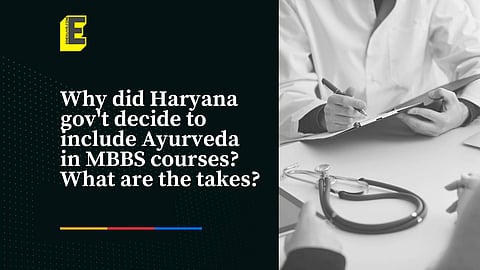

The Haryana government has decided to mingle modern medicine and Ayurveda for medical students of the state. Health Minister Anil Vij announced on February 3, Friday, that Ayurvedic medicine will be introduced for a year under the 5-year MBBS programme, while modern medicine will be taught for the remaining four years. The news has given air to deliberations on Mixopathy, a term which describes a mix of the genres of medicine.
Minister Vij announced the new programme would be launched soon. He cited that the move would help promote the traditional system of medicine, adding that Allopathy and Ayurveda should be integrated. On the other hand, Indian Medical Association (IMA) Haryana, and other surrounding regions, have opposed the move.
"MBBS is an extensive course. Students need to excel in one particular course. Instead of introducing this new programme, education and research opportunities in the existing medical colleges should be improved," Dr Karan Juneja, President of IMA Junior Doctors' Network (JDN) Haryana, said. He added that if the present proposal is implemented, students will neither be good Allopathic nor good Ayurvedic doctors.
"Also, students who opt for advanced courses degrees like Postgraduation (PG) or Super Speciality (SS) would be "left hanging in the middle," Dr Juneja pointed out. Similarly, Dr RV Asokan, President-elect of IMA Haryana, speaking out strongly against the move, stated, "India has 650 medical colleges and every year 99,063 MBBS doctors graduate. There is neither shortage of doctors nor any need to change the system.
He further stated Indian doctors have proved their mettle in different health systems of the world, and the concept of mixing different systems of medicine was dangerous. "Producing medical graduates through irreconcilable systems is unscientific and the first casualty is the patient. It is anti-people and will lead to loss of lives," he said.
The experts point out that the state government's decision is also against the National Medical Commission (NMC) guidelines, since the regulating body does not permit such hybrid programmes. Dr Anilkumar J Nayak, a former member of the NMC Advisory Council, and member of IMA, confirms this fact. "For starting any medical course, NMC's permission is required. That s the law, recognised by the Constitution."
He explained a case in Assam as an example. "The Assam Government had introduced a 3-year diploma course to enable people from rural areas to practice modern medicine. Though it was introduced long ago, a case related to it was being heard in the Supreme Court, as the course was not recognised by the law," he said. As per news reports, on January 24, 2023, the apex court struck down the Assam Rural Health Regulatory Authority Act, 2004,
As mentioned in a report by The Meghalayan, a division bench, which was hearing the case, pronounced that the state legislature lacked the necessary competence to formulate it, and added that the needed mechanism for producing doctors for primary, secondary and tertiary sectors was in place and within the mandate of authorities recognised by the Parliament. The court further had further said that it opposes Assam's attempt to encroach upon this exclusive domain, and that uniform standards have been laid down across the country for medical education.
Dr Nayak is afraid a similar fate might meet the Haryana government's decision, if students approached a court. "We also should learn from the mistakes of our past and from our neighbour. A few years ago, China had introduced a mix-up course of modern and ancient Chinese medicine. But the course was soon discontinued because it failed," he informed.
The expert suggests a holistic approach, where people are free to choose the type of treatment they want. "People can opt for Ayurveda and Homeopathy where Allopathy fails and Allopathic doctors can recommend it. We have to respect every practice," he stated.
He also pointed out that Ayurveda was a vast course and has its own schedule and structure. "It is a 5-year course. MBBS students cannot be expected to learn it in a year, just as an Ayurvedic doctor cannot be expected to learn modern medicine in a year," he observed.
Looking the other way
Dr Vinayak Tembhurnikar, National President of NIMA (National Integrated Medical Association), the largest organisation of AYUSH (Ayurveda, Yoga and Naturopathy, Unani, Siddha and Homeopathy) doctors, agreed that the move was not in the right direction. "There is no need to introduce Ayurveda in MBBS courses. It is indeed a vast course. And the courses are well structured so as to include modern medicine practices," he said.
Dr Tembhurnikar further explained that there were many common grounds between AYUSH and Allopahthy, as the basic courses like Human Physiology, Anatomy and surgical practices were the same for both. "Integration is the need of the hour. Many states have allowed AYUSH doctors to practice modern medicine, and the Centre has supported it. There is no such thing as Mixopathy," he concluded.
